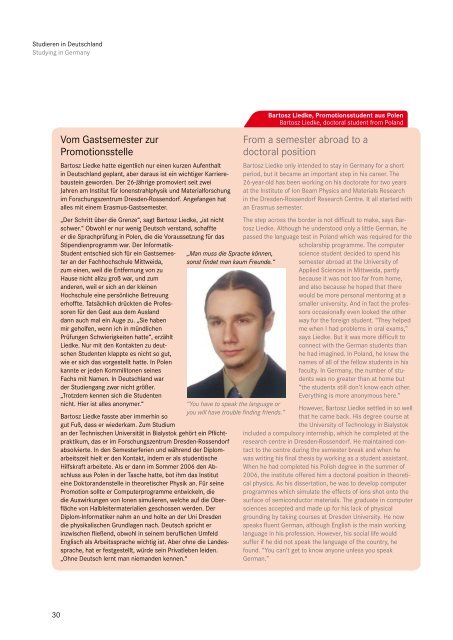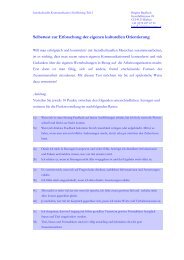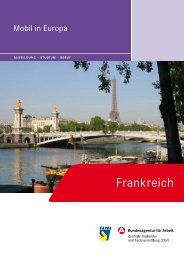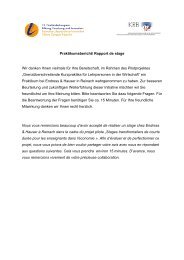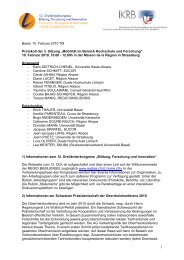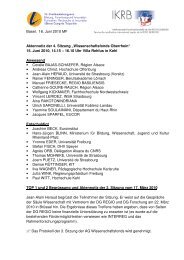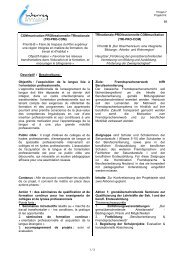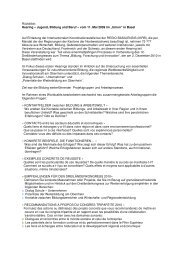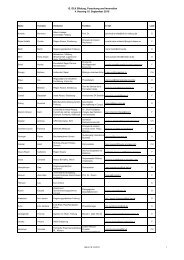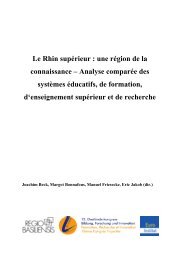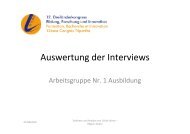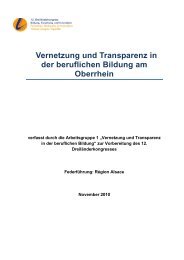Bildungswege in Deutschland - Education in Germany
Bildungswege in Deutschland - Education in Germany
Bildungswege in Deutschland - Education in Germany
Erfolgreiche ePaper selbst erstellen
Machen Sie aus Ihren PDF Publikationen ein blätterbares Flipbook mit unserer einzigartigen Google optimierten e-Paper Software.
Studieren <strong>in</strong> <strong>Deutschland</strong><br />
Study<strong>in</strong>g <strong>in</strong> <strong>Germany</strong><br />
Vom Gastsemester zur<br />
Promotionsstelle<br />
Bartosz Liedke hatte eigentlich nur e<strong>in</strong>en kurzen Aufenthalt<br />
<strong>in</strong> <strong>Deutschland</strong> geplant, aber daraus ist e<strong>in</strong> wichtiger Karrierebauste<strong>in</strong><br />
geworden. Der 26-Jährige promoviert seit zwei<br />
Jahren am Institut für Ionenstrahlphysik und Materialforschung<br />
im Forschungszentrum Dresden-Rossendorf. Angefangen hat<br />
alles mit e<strong>in</strong>em Erasmus-Gastsemester.<br />
„Der Schritt über die Grenze“, sagt Bartosz Liedke, „ist nicht<br />
schwer.“ Obwohl er nur wenig Deutsch verstand, schaffte<br />
er die Sprachprüfung <strong>in</strong> Polen, die die Voraussetzung für das<br />
Stipendienprogramm war. Der Informatik-<br />
Student entschied sich für e<strong>in</strong> Gastsemester<br />
an der Fachhochschule Mittweida,<br />
zum e<strong>in</strong>en, weil die Entfernung von zu<br />
Hause nicht allzu groß war, und zum<br />
anderen, weil er sich an der kle<strong>in</strong>en<br />
Hochschule e<strong>in</strong>e persönliche Betreuung<br />
erhoffte. Tatsächlich drückten die Professoren<br />
für den Gast aus dem Ausland<br />
dann auch mal e<strong>in</strong> Auge zu. „Sie haben<br />
mir geholfen, wenn ich <strong>in</strong> mündlichen<br />
Prüfungen Schwierigkeiten hatte“, erzählt<br />
Liedke. Nur mit den Kontakten zu deutschen<br />
Studenten klappte es nicht so gut,<br />
wie er sich das vorgestellt hatte. In Polen<br />
kannte er jeden Kommilitonen se<strong>in</strong>es<br />
Fachs mit Namen. In <strong>Deutschland</strong> war<br />
der Studiengang zwar nicht größer.<br />
„Trotzdem kennen sich die Studenten<br />
nicht. Hier ist alles anonymer.“<br />
Bartosz Liedke fasste aber immerh<strong>in</strong> so<br />
gut Fuß, dass er wiederkam. Zum Studium<br />
an der Technischen Universität <strong>in</strong> Bialystok gehört e<strong>in</strong> Pflichtpraktikum,<br />
das er im Forschungszentrum Dresden-Rossendorf<br />
absolvierte. In den Semesterferien und während der Diplomarbeitszeit<br />
hielt er den Kontakt, <strong>in</strong>dem er als studentische<br />
Hilfskraft arbeitete. Als er dann im Sommer 2006 den Abschluss<br />
aus Polen <strong>in</strong> der Tasche hatte, bot ihm das Institut<br />
e<strong>in</strong>e Doktorandenstelle <strong>in</strong> theoretischer Physik an. Für se<strong>in</strong>e<br />
Promotion sollte er Computerprogramme entwickeln, die<br />
die Auswirkungen von Ionen simulieren, welche auf die Oberfläche<br />
von Halbleitermaterialien geschossen werden. Der<br />
Diplom-Informatiker nahm an und holte an der Uni Dresden<br />
die physikalischen Grundlagen nach. Deutsch spricht er<br />
<strong>in</strong>zwischen fließend, obwohl <strong>in</strong> se<strong>in</strong>em beruflichen Umfeld<br />
Englisch als Arbeitssprache wichtig ist. Aber ohne die Landessprache,<br />
hat er festgestellt, würde se<strong>in</strong> Privatleben leiden.<br />
„Ohne Deutsch lernt man niemanden kennen.“<br />
„Man muss die Sprache können,<br />
sonst f<strong>in</strong>det man kaum Freunde.“<br />
“You have to speak the language or<br />
you will have trouble f<strong>in</strong>d<strong>in</strong>g friends.”<br />
Bartosz Liedke, Promotionsstudent aus Polen<br />
Bartosz Liedke, doctoral student from Poland<br />
From a semester abroad to a<br />
doctoral position<br />
Bartosz Liedke only <strong>in</strong>tended to stay <strong>in</strong> <strong>Germany</strong> for a short<br />
period, but it became an important step <strong>in</strong> his career. The<br />
26-year-old has been work<strong>in</strong>g on his doctorate for two years<br />
at the Institute of Ion Beam Physics and Materials Research<br />
<strong>in</strong> the Dresden-Rossendorf Research Centre. It all started with<br />
an Erasmus semester.<br />
The step across the border is not difficult to make, says Bartosz<br />
Liedke. Although he understood only a little German, he<br />
passed the language test <strong>in</strong> Poland which was required for the<br />
scholarship programme. The computer<br />
science student decided to spend his<br />
semester abroad at the University of<br />
Applied Sciences <strong>in</strong> Mittweida, partly<br />
because it was not too far from home,<br />
and also because he hoped that there<br />
would be more personal mentor<strong>in</strong>g at a<br />
smaller university. And <strong>in</strong> fact the professors<br />
occasionally even looked the other<br />
way for the foreign student. “They helped<br />
me when I had problems <strong>in</strong> oral exams,”<br />
says Liedke. But it was more difficult to<br />
connect with the German students than<br />
he had imag<strong>in</strong>ed. In Poland, he knew the<br />
names of all of the fellow students <strong>in</strong> his<br />
faculty. In <strong>Germany</strong>, the number of students<br />
was no greater than at home but<br />
“the students still don’t know each other.<br />
Everyth<strong>in</strong>g is more anonymous here.”<br />
However, Bartosz Liedke settled <strong>in</strong> so well<br />
that he came back. His degree course at<br />
the University of Technology <strong>in</strong> Bialystok<br />
<strong>in</strong>cluded a compulsory <strong>in</strong>ternship, which he completed at the<br />
research centre <strong>in</strong> Dresden-Rossendorf. He ma<strong>in</strong>ta<strong>in</strong>ed contact<br />
to the centre dur<strong>in</strong>g the semester break and when he<br />
was writ<strong>in</strong>g his f<strong>in</strong>al thesis by work<strong>in</strong>g as a student assistant.<br />
When he had completed his Polish degree <strong>in</strong> the summer of<br />
2006, the <strong>in</strong>stitute offered him a doctoral position <strong>in</strong> theoretical<br />
physics. As his dissertation, he was to develop computer<br />
programmes which simulate the effects of ions shot onto the<br />
surface of semiconductor materials. The graduate <strong>in</strong> computer<br />
sciences accepted and made up for his lack of physical<br />
ground<strong>in</strong>g by tak<strong>in</strong>g courses at Dresden University. He now<br />
speaks fluent German, although English is the ma<strong>in</strong> work<strong>in</strong>g<br />
language <strong>in</strong> his profession. However, his social life would<br />
suffer if he did not speak the language of the country, he<br />
found. “You can’t get to know anyone unless you speak<br />
German.”<br />
30


